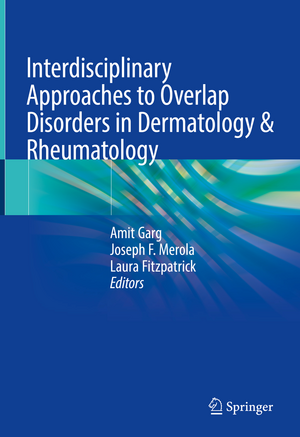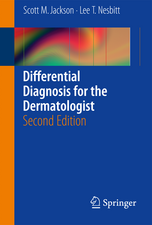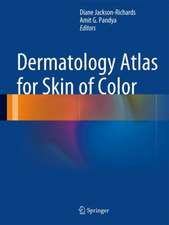Interdisciplinary Approaches to Overlap Disorders in Dermatology & Rheumatology
Editat de Amit Garg, Joseph F. Merola, Laura Fitzpatricken Limba Engleză Hardback – 11 ian 2022
The book discusses hallmark mucocutaneous features which support, and often specify, diagnosis, and it provides a summary of relevant multisystem examinations, serologic workup, and imaging. Interdisciplinary perspectives on treatment also facilitate a streamlined approach to referral and co-management. Interdisciplinary Approaches to Overlap Disorders in Dermatology & Rheumatology is a must-have resource for dermatologists, rheumatologists, internists, as well as students of medicine and trainees across medical specialties.
Preț: 988.51 lei
Preț vechi: 1040.54 lei
-5% Nou
Puncte Express: 1483
Preț estimativ în valută:
189.16€ • 198.15$ • 156.77£
189.16€ • 198.15$ • 156.77£
Carte tipărită la comandă
Livrare economică 04-10 aprilie
Preluare comenzi: 021 569.72.76
Specificații
ISBN-13: 9783319184456
ISBN-10: 3319184458
Pagini: 300
Ilustrații: XIV, 291 p. 99 illus., 96 illus. in color.
Dimensiuni: 178 x 254 mm
Greutate: 0.86 kg
Ediția:1st ed. 2022
Editura: Springer International Publishing
Colecția Springer
Locul publicării:Cham, Switzerland
ISBN-10: 3319184458
Pagini: 300
Ilustrații: XIV, 291 p. 99 illus., 96 illus. in color.
Dimensiuni: 178 x 254 mm
Greutate: 0.86 kg
Ediția:1st ed. 2022
Editura: Springer International Publishing
Colecția Springer
Locul publicării:Cham, Switzerland
Public țintă
Professional/practitionerCuprins
I. Introduction to Rheumatic Skin DiseasesII. Examining the IntegumentIII. Cutaneous LupusIV. DermatomyositisV. SclerodermaVI. The Psoriatic ComplexVII. VasculitisVIII. SarcoidosisIX. SerologiesA conventional approach might be-EpidemiologyPathophysiologyHistoryPhysical ExaminationLaboratory testing and ImagingDifferential DiagnosisTreatmentSystemic ComponentsCourse and PrognosisClinical Images.
Notă biografică
Amit Garg, MD, is a Professor and the Founding Chair for the Department of Dermatology at the Donald and Barbara Zucker School of Medicine at Hofstra / Northwell. He is a Professor in the Center for Health Innovation and Outcomes Research at the Feinstein Institutes for Medical Research. At present, Dr. Garg also serves as the training director for the residency program in dermatology. He is board certified in Dermatology by the American Board of Dermatology. Dr. Garg earned his medical degree from the University of Massachusetts Medical School. He completed his internship and residency in dermatology at the University of Illinois at Chicago. He has held faculty positions at University of Massachusetts and at Boston University Medical Center, where he directed the Residency Training Program in Dermatology as well as the undergraduate medical curricula in dermatology for the school of medicine. Dr. Garg has had leadership roles within prominent national professional organizations, including the American Academy of Dermatology, the American Board of Dermatology, the Association of Professors of Dermatology, the Medical Dermatological Society, the National Psoriasis Foundation, the Hidradenitis Suppurativa Foundation, the Group for Research and Assessment of Psoriasis and Psoriatic Arthritis, and the International Dermatology Outcome Measures group. He currently serves as the Vice Chair of the Dermatology's Residency Review Committee at the Accreditation Counsel of Graduate Medical Education (ACGME).
Joseph F. Merola, MD, MMSc is board-certified in Dermatology, Rheumatology and Internal Medicine. He is an Associate Professor at Harvard Medical School in the Department of Dermatology and Department of Medicine, Division of Rheumatology in Boston, Massachusetts. He serves as the Vice Chair for Clinical Trials and Innovation, the Director of the Clinical Unit for Research Innovation and Trials (CUReIT), Director of the Center for Skin and Related Musculoskeletal Diseases and the Associate Program Director for the Harvard Combined Internal Medicine-Dermatology Residency Training Program at Brigham and Women’s Hospital in Boston. Dr. Merola earned his medical degree at New York University School of Medicine in New York, New York and his Master of Medical Sciences degree at Harvard Medical School. He completed an internship in Internal Medicine at the Hospital of the University of Pennsylvania in Philadelphia, followed by a residency in Dermatology at New York University Medical Center. He continued with a residency in Internal Medicine and a fellowship in Rheumatology at Brigham and Women’s Hospital. Dr. Merola is on the Scientific and Medical Boards of the National Psoriasis Foundation, the Board of the International Dermatology Outcome Measures Group and Executive Committee for GRAPPA (Group for Research and Assessment of Psoriasis and Psoriatic Arthritis), the Board of the Lupus Foundation of America and is on the Board and Founding President of the Psoriasis and Psoriatic Arthritis Clinics Multicenter Advancement Network Consortium (PPACMAN). He is also the president of the Medical Dermatology Society.
Textul de pe ultima copertă
This comprehensive textbook provides physicians with a practical evidence-based framework to evaluate and manage patients suspected of having overlap disorders involving the integumentary, musculoskeletal and related systems.
The book discusses hallmark mucocutaneous features which support, and often specify, diagnosis, and it provides a summary of relevant multisystem examinations, serologic workup, and imaging. Interdisciplinary perspectives on treatment also facilitate a streamlined approach to referral and co-management. Interdisciplinary Approaches to Overlap Disorders in Dermatology & Rheumatology is a must-have resource for dermatologists, rheumatologists, internists, as well as students of medicine and trainees across medical specialties.
The book discusses hallmark mucocutaneous features which support, and often specify, diagnosis, and it provides a summary of relevant multisystem examinations, serologic workup, and imaging. Interdisciplinary perspectives on treatment also facilitate a streamlined approach to referral and co-management. Interdisciplinary Approaches to Overlap Disorders in Dermatology & Rheumatology is a must-have resource for dermatologists, rheumatologists, internists, as well as students of medicine and trainees across medical specialties.
Caracteristici
Provides dermatologists with a framework with which to manage patients suspected to have rheumatic skin disorders
Closes the gap for practicing dermatologists and rheumatologists between current and best practices
Addresses the history and physical findings that characterize cutaneous and systemic components
Closes the gap for practicing dermatologists and rheumatologists between current and best practices
Addresses the history and physical findings that characterize cutaneous and systemic components


















